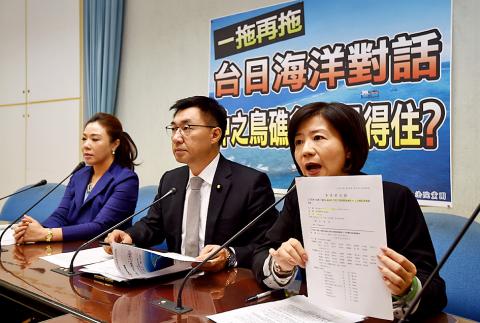The first in a series of discussion between Taiwan and Japan on maritime affairs was held in Tokyo yesterday, with delegations from the two nations set to discuss issues of mutual concern, including fishing rights near the Japan-held Okinotori atoll in the Pacific Ocean.
The dialogue began with a handshake between Association of East Asian Relations (AEAR) president Chiou I-jen (邱義仁) and Japan’s Interchange Association Chairman Ohashi Mitsuo.
The two organizations were established to handle relations between Taiwan and Japan in the absence of full diplomatic ties.

Photo: Chien Jung-fong, Taipei Times
Chiou is serving as an adviser to the Taiwanese delegation.
The delegation, headed by AEAR Secretary-General Peter Tsai (蔡明耀), is comprised of officials from a number of government agencies, including those involved with fisheries, the coast guard, technology, national security and foreign affairs.
The meeting’s agenda includes fishing around the atoll.
The government has said it will negotiate with Japan on the issue in a bid to ensure the rights and safety of Taiwanese fishermen.
Minister of Foreign Affairs David Lee (李大維) last week said that issues to be addressed during the one-day dialogue would include fishing disputes, rescue operations at sea and marine scientific research.
The most recent dispute erupted after a Taiwanese fishing boat was on April 25 seized by Japan on the high seas near Okinotori, a 9m2 uninhabited Pacific atoll about 1,600km east of Taiwan.
The administration of then-president Ma Ying-jeou (馬英九) lodged a protest with Tokyo after Japanese authorities refused to release the boat until the owner paid a security deposit of ¥6 million (US$57,152 at the current exchange rate).
Japan classifies the atoll as an island, which would entitle it to a 200 nautical mile (370.4km) exclusive economic zone.
Taiwan maintains that it is not an island, because it cannot sustain human habitation and has accused Japan of carrying out land reclamation work to expand the formation.
After President Tsai Ing-wen (蔡英文) took office in May, her administration pushed for a Taiwan-Japan dialogue on maritime affairs under the Taiwan-Japan Maritime Affairs Cooperation Dialogue Mechanism, in an effort to promote bilateral ties and bridge differing opinions on controversial issues.
Tsai has said that as maritime nations, Taiwan and Japan share common issues and interests, about which the two sides should talk.
However, she said that as president, her primary concern is to ensure that Taiwanese fishermen can make a living in the disputed waters without fear of harassment.
As a result, issues concerning maritime resources are the nation’s top priority at the dialogue, followed by the protection and cultivation of fishery resources, maritime aid, rescue missions and maritime scientific research, Tsai said.

SECURITY: As China is ‘reshaping’ Hong Kong’s population, Taiwan must raise the eligibility threshold for applications from Hong Kongers, Chiu Chui-cheng said When Hong Kong and Macau citizens apply for residency in Taiwan, it would be under a new category that includes a “national security observation period,” Mainland Affairs Council (MAC) Minister Chiu Chui-cheng (邱垂正) said yesterday. President William Lai (賴清德) on March 13 announced 17 strategies to counter China’s aggression toward Taiwan, including incorporating national security considerations into the review process for residency applications from Hong Kong and Macau citizens. The situation in Hong Kong is constantly changing, Chiu said to media yesterday on the sidelines of the Taipei Technology Run hosted by the Taipei Neihu Technology Park Development Association. With

CARROT AND STICK: While unrelenting in its military threats, China attracted nearly 40,000 Taiwanese to over 400 business events last year Nearly 40,000 Taiwanese last year joined industry events in China, such as conferences and trade fairs, supported by the Chinese government, a study showed yesterday, as Beijing ramps up a charm offensive toward Taipei alongside military pressure. China has long taken a carrot-and-stick approach to Taiwan, threatening it with the prospect of military action while reaching out to those it believes are amenable to Beijing’s point of view. Taiwanese security officials are wary of what they see as Beijing’s influence campaigns to sway public opinion after Taipei and Beijing gradually resumed travel links halted by the COVID-19 pandemic, but the scale of

A US Marine Corps regiment equipped with Naval Strike Missiles (NSM) is set to participate in the upcoming Balikatan 25 exercise in the Luzon Strait, marking the system’s first-ever deployment in the Philippines. US and Philippine officials have separately confirmed that the Navy Marine Expeditionary Ship Interdiction System (NMESIS) — the mobile launch platform for the Naval Strike Missile — would take part in the joint exercise. The missiles are being deployed to “a strategic first island chain chokepoint” in the waters between Taiwan proper and the Philippines, US-based Naval News reported. “The Luzon Strait and Bashi Channel represent a critical access

Pope Francis is be laid to rest on Saturday after lying in state for three days in St Peter’s Basilica, where the faithful are expected to flock to pay their respects to history’s first Latin American pontiff. The cardinals met yesterday in the Vatican’s synod hall to chart the next steps before a conclave begins to choose Francis’ successor, as condolences poured in from around the world. According to current norms, the conclave must begin between May 5 and 10. The cardinals set the funeral for Saturday at 10am in St Peter’s Square, to be celebrated by the dean of the College